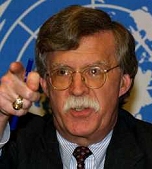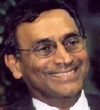 The Financial Times’s Mark Turner, an early friend of this blog, reports on today’s participation of three SG contenders in the World Economic Forum in Davos, Switzerland. As reported here earlier, rumored SG candidates Ban Ki-Moon (South Korea), Vaira Vike-Freiberga (Latvia) and Jayantha Dhanapala (Sri Lanka) will participate in a panel discussion on the future of the UN with current SG Kofi Annan. Neither Surakiart Sathirathai (Thailand) nor Aleksander Kwasniewski (Poland), other front runners, will appear.
The Financial Times’s Mark Turner, an early friend of this blog, reports on today’s participation of three SG contenders in the World Economic Forum in Davos, Switzerland. As reported here earlier, rumored SG candidates Ban Ki-Moon (South Korea), Vaira Vike-Freiberga (Latvia) and Jayantha Dhanapala (Sri Lanka) will participate in a panel discussion on the future of the UN with current SG Kofi Annan. Neither Surakiart Sathirathai (Thailand) nor Aleksander Kwasniewski (Poland), other front runners, will appear.
The article provides additional insight for the three candidates (only Dhanapala is officially in the race) and their priorities for the UN if selected:
Mr Ban said: “The secretariat has . . . been discredited by criticisms of inefficiency and corruption. The new secretary-general must reform the culture of the organisation, increase accountability and toughen ethics. The SG . . . must be given the flexibility to manage. There must be a sense of accountability among the staff of the secretariat.”
Ms Vike-Freiberga said: “The first challenge is to restore confidence in the organisation, as the world body we look to as an initiator of ideas, of movements to solve the world’s problems.” But “we get the feeling that the current reforms are being received with reservations in some countries, who see it as an imposition by richer more developed nations.”
Mr Dhanapala said: “I believe the global system must find a way not only to accommodate a rising China but a rising India, so we can have a harmonious accommodation of more economic powers which will be able to share responsibility.”
While the Davos meetings are attended – sorry, invitation only – by government and business elites, the public is invited to view the discussions via webcast today at 18:45 Davos time (12:45 New York time) or podcast afterwards.


 Dhanapala, who chaired the remarkably successful 1995 NPT Review Conference, was the Under SG for Disarmament affairs before returning to Sri Lanka in 2003 to serve as the secretary general for the
Dhanapala, who chaired the remarkably successful 1995 NPT Review Conference, was the Under SG for Disarmament affairs before returning to Sri Lanka in 2003 to serve as the secretary general for the 





